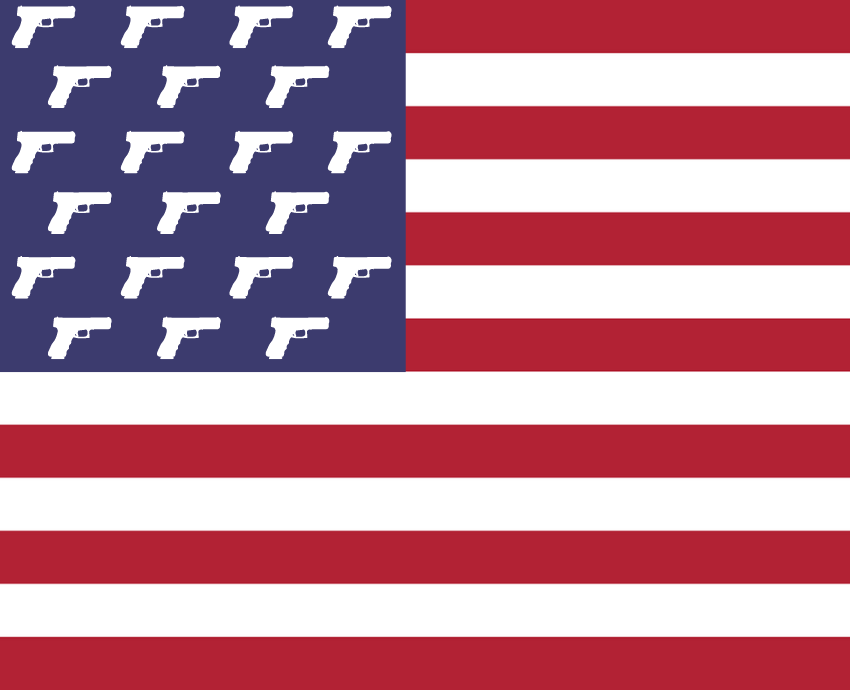
In June, the United States Supreme Court struck down a New York state law that restricted the carrying of guns in public. Since then, 38 states have legislated some form of "open carry" laws, and others are preparing to do the same.
The US is known for a “pro-gun” culture, and this decision only increases gun violence. Now, any person could be carrying a weapon in public and others have to take that into account. Some are acquiring guns as self defence as a result.
In the few states that don’t yet have open carry laws, it is easy to get guns legally and there are large numbers of illegal guns in people’s hands.
Hawaii is the only state that requires all guns to be registered. In Michigan, pistol purchases must be registered. California requires only .50 calibre rifles and assault weapons like AR-15s to be registered. In Maryland, New Jersey and New York, only assault weapons must be registered.
Among rich countries, the US is an outlier in the number of gun homicides. Figures updated in September show that per 100,000 inhabitants, there are 4.12 gun homicides in the US. The next highest is Canada, with 0.5. In Europe, the figures are even lower: Portugal — 0.4; Italy — 0.35; Belgium — 0.34; France — 0.32; Germany — 0.08; and Britain — 0.04. Australia is at 0.18 and Japan at 0.02.
Shootings and killings are frequent in all US states. In the San Francisco Bay Area local TV stations report one or more shootings every day, many resulting in deaths.
There have been 12 mass shootings in the US this year, using the FBI’s definition of four or more people killed. Using CNN’s and the New York Times’ definition of four or more shot, there have been 606 mass shootings.
In the weeks leading up to the November 25 Thanksgiving holiday, the New York Times published the four most noted mass shootings. Four students at a Philadelphia high school were shot by a drive-by shooter after they were dismissed for the holidays on November 23.
Five people were killed by a shooter with an AR-15 assault rifle in a hate crime at an LGBTIQ-friendly bar, Club Q, in Colorado Springs, Colorado, on November 19. That night there was a drag show on, which drew a mixed crowd. More people would have died, if it hadn’t been for a patron with military training who tackled and subdued the shooter.
Three students, all football players, were killed at the University of Virginia on November 13, while on a bus returning from a play they had been sent to see by their teacher.
In Chesapeake, Virginia, six workers on the night shift at a Walmart store were killed by the night manager on November 22. He shot them in their break room with a hand gun he had bought that day, before turning it on himself.
Like the club Q shooting, others have been classified as hate crimes. Victims have been Blacks, Latinos, Asians and other non-whites. Others have been worshippers at synagogues and mosques. White nationalists, emboldened by the rhetoric and policies of far-right Republicans, have been found responsible for these shootings.
The Walmart store shooting can be chalked up to increasing acceptance that guns are seen as appropriate means to settle workplace disputes.
Others are for unknown reasons, but also result from gun culture.
Domestic and family gun violence and other forms of gender and sexual violence aren’t labeled hate crimes, but should be.
The NYT ran a feature article on armed white nationalist protesters since 2020. That year, protests against public health measures to deal with the pandemic exploded and other protests targeted the Black Lives Matter movement.
This year, demonstrations that included armed contingents are most likely to be targeting protests for abortion and LGBTIQ rights, the NYT reported. There were spikes in such demonstrations at gay pride events and after the Supreme Court’s overturning of the right to abortion.
In June, armed contingents at demonstrations amounted to nearly one a day. In one case, a former Republican state legislator led a group protesting a gay pride event in Coeur d’Alene, Idaho.
Juneteenth is known as the anniversary of the abolition of slavery in Texas. In Franklin, Tennessee, armed men interrupted a Juneteenth celebration, handing out fliers claiming that white people were being “replaced”.
Armed men confronted Democratic candidate Beto O’Rourke while he was campaigning for governor of Texas, in Whitesboro, in July.
At the Museum of Science and Technology in Memphis, Tennessee, armed protesters forced the cancelation of an LGBTIQ dance, in September, which was capping off a summer-long series on the history of the LGBTIQ community in the South.
Proud Boys members armed with guns joined a rally in Nashville, Tennessee, in October, where far right Republicans spoke against medical gender treatment for trans kids.
The NYT analysed about 700 armed demonstrations since 2020, and found that 77% were of people with far-right views.
The NYT did not count armed demonstrators at indoor meetings, such as school board meetings, where groups like the Proud Boys oppose school curricula including books and discussion of the history of racial oppression and LGBTIQ people.
Armed people have also been intimidating libraries not to carry such material.
In some instances, where targets were informed of pending armed demonstrations, they formed armed defense guards.
Half of the armed demonstrations since 2020 occurred in 10 states with open carry laws: Arizona, Georgia, Kentucky, Michigan, North Carolina, Oregon, Pennsylvania, Texas, Virginia and Washington.
With the Supreme Court ruling and open carry laws sweeping the country, many more states are seeing and will see such armed demonstrations.